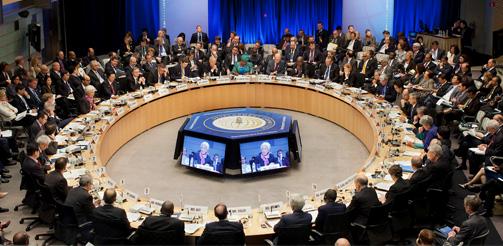I recently had the honour to attend the 3rd Delhi Conference on South-South and Triangular Cooperation where policymakers, researchers, and practitioners discussed the challenges and opportunities of South-South Cooperation (SSC) in the context of the UN 2030 Agenda for Sustainable Development. Although the thrust of their discussions remain progressive, the repetition of traditional patterns might undermine the contribution of SSC to the achievement of the Sustainable Development Goals (SDGs).

The role of the Global South in the 2030 Agenda for Sustainable Development is still being defined ahead of the Second UN High-Level Conference on South-South Cooperation (BAPA+40), to be held in Buenos Aires in March 2019. When discussing interlinkages between the SDGs and SSC, there is a restlessness to not reproduce the traditional patterns of development cooperation paradigms. This might sound like an easy task, but, for example, by underestimating the power relations that govern relationships and development cooperation in general, Southern partners might miss what could be the biggest opportunity to highly influence the global development agenda.
This big opportunity depends on many aspects that have been raised during the 3rd Delhi Conference on South-South and Triangular Cooperation (24-25 August 2017). I would however stress two points that, in my opinion, have not been discussed at length – or at all.
Exploring the Global South’s experience in challenging dominant narratives and paradigms
First, the SDGs, which is more than a simple subsequent development agenda, require changes to the model of development – for it is largely acknowledged that we cannot continue living the way we live. Implementing and striving towards the achievement of the SDGs means making changes in our life: changes in the way we manage resources, transform, sell, buy, import and export goods and services. But also, in social and interpersonal terms, changes in individual behaviour and, more importantly, changes in how we relate to each other and to natural resources.
In this regard, Southern partners have a history and an extensive experience of struggle, for SSC initially emerged from the idea of changing the dominant narratives of development and international relations. A core idea was not to reproduce vertical relationships between countries as well as to make the international arena a more fair and balanced political space. Different approaches and a multitude of perspectives are exactly what are needed for the achievement of the SDGs. From this perspective, the 2030 Agenda provide the space for Southern actors to incorporate the SSC principles holistically and on different dimensions: equality and a more balanced relationship amongst countries, but also amongst individuals, generations, genders, the rich and the poor, the rural and the urban, and so on and so forth.
Further understanding for stronger action: historical perspectives and assessment of SSC practice on the road to BAPA+40
This leads to my second point, being the need to develop a deeper understanding of the relationships that govern development cooperation initiatives and are the main characteristic that distinguishes South-South Cooperation actions. If we look only at the outlines and objectives of SSC projects, they differ very little from those of programmes and projects implemented by Northern donors or Bretton Wood organisations. It seems that the significant distinction of SSC lies in how relationships, processes and institutions are built by Southern partners. Understanding these differences is essential for the incorporation and integration of SSC principles into the 2030 Agenda.
From this point, another interesting aspect to explore is the footprint of SSC initiatives in partner countries. What has been the role of SSC in the history of development cooperation? This is not about the history of South-South paradigms nor is it a history of conferences held and principles agreed upon. Instead, it is about understanding the legacy of SSC in the development history of partner countries to better acknowledge, assess and explain SSC principles and diversity. The BAPA+40 as well as the preliminary work until 2019, will be a great opportunity for presenting evidences of SSC legacies in development history.
In addition to this, there is a need of further engagement with the countries that host South-South initiatives and that are still underrepresented in most of the international arenas – including Delhi – in order to avoid creating a South within the South. One way forward is by challenging dominant narratives of international development, deviating from traditional patterns and shaping new types of relationships whereby SSC can function as both a pioneer and as a role model to contribute to the fulfilment of the 2030 Agenda for Sustainable Development.
Alvaro Moreira is a PhD candidate at the Institute of Development Studies
Image: International Monetary Fund on Flickr
